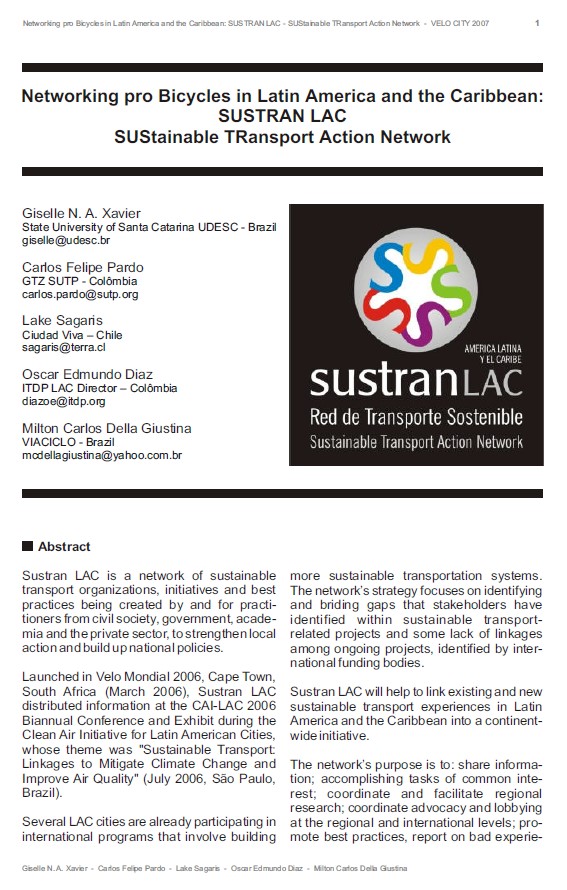Networking pro Bicycles in Latin America and the Caribbean
Tipo de publicação
Relatório de Pesquisa
Tipo de autoria
Pessoa Física
Nome do autor
Giselle N. A. Xavier - Carlos Felipe Pardo - Lake Sagaris - Oscar Edmundo Diaz - Milton Carlos Della Giustina
Língua
Inglês
Abrangência geográfica
Internacional/Mundial
Ano da publicação
2007
Palavra chave 1
Planejamento
Palavra chave 2
política de transporte
Palavra chave 3
Políticas Públicas
Descrição
Several Latin American cities have become world leaders in Sustainable Transport Initiatives.
With the implementation of successful public transport systems, the creation of public spaces with facilities that are accessible to all and the provision of infrastructure to NMT, there were remarkable changes in the urban environment and the quality of living in these cities. Mayors that implemented the successful innovations have been teaching, writing and serving as consultants around the world.
In LAC cities the enormous need to improve civic life, to improve equality, quality of life, and safety in urban centres has caused community development to examine urban transportation, particularly how it upholds or undermines peoples’ rights and access equal opportunities, health care, education and other benefits. Experience and studies elsewhere clearly demonstrate that a car-based model will not achieve these goals, which are vital to building sustainable cities.
This approach therefore involves democratic/governance and economic facets, as well as transport design and policy.
Cycling and walking, including walks to and from public transport nodes, have similar implications for quality public space and sustainability. Promoting active transport is vital to move ahead, linking with public health/environment campaigns, teams and issues, making the most of existing strengths. Community development models must be applied to build the skills, perspectives and abilities required for community members to become active, engaged citizens.
Despite considerable growth in recent years, the “sustainable transport community” in Latin America remains relatively small. This both facilitates and makes all the more important the building of strong relationships of support and cooperation among the network members. There are many tools and strategies available for community organizations wanting to address crucial transportation issues, whether on specific neighborhood streets or in terms of local, regional and even national transportation policymaking.
Where the individual tools can be combined into coherent strategies applied over a medium – to longterm horizon, communities can expect to be more effective.
There is a huge need to create effective links and networks, through which the strengths in some cities and countries can flow toward those with different strengths, or seeking the kinds of solutions applied elsewhere. There is a lot of space for exchange and capacity building among LAC cities/countries.



 Ao navegar no Observatório da Bicicleta você concorda com os
Ao navegar no Observatório da Bicicleta você concorda com os